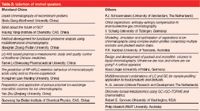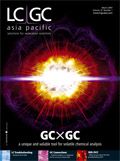Meeting Preview: 30th ISCC and 4th GC×GC Symposium
LCGC Asia Pacific
In June of this year, the 30th meeting in the International Symposium in Capillary Chromatography series will convene in Dalian, People's Republic of China. The meeting promises to be a major celebration of separation science, and the separation science community has thrown its weight behind this initiative. The meeting is held under the auspices of the "International Organization for Promotion of Microcolumn Separations" and the "Chinese Academy of Science," with support from various organizations in China. Combined with the "4th Comprehensive Two-dimensional Gas Chromatography Symposium" and the "16th Chinese Symposium and Exhibition on Chromatography," the conference will offer many opportunities to present both international and regional accomplishments in chromatography. During the period of the symposia an exhibition will be held to showcase newly developed instruments and reagents from manufacturers around the world.
In June of this year, the 30th meeting in the International Symposium in Capillary Chromatography series will convene in Dalian, People's Republic of China. The meeting promises to be a major celebration of separation science, and the separation science community has thrown its weight behind this initiative. The meeting is held under the auspices of the "International Organization for Promotion of Microcolumn Separations" and the "Chinese Academy of Science," with support from various organizations in China. Combined with the "4th Comprehensive Two-dimensional Gas Chromatography Symposium" and the "16th Chinese Symposium and Exhibition on Chromatography," the conference will offer many opportunities to present both international and regional accomplishments in chromatography. During the period of the symposia an exhibition will be held to showcase newly developed instruments and reagents from manufacturers around the world. Additionally, a short course on GC×GC–MS, GC–MS and LC–MS will be held on Sunday 3 June (Table 1). More details can be found at www.iscc.dicp.ac.cn

Table 1: Timetable of events.
Dalian has a well-deserved reputation as a seaside destination for both local and international travellers. It is well connected by airline routes to Beijing, Shanghai, Hong Kong and Japan. The internationally acclaimed "Dalian Institute of Chemical Physics" (a key Institute of the Chinese Academy of Science), which has arguably the highest concentration of chromatography and separation science researchers in China, is the home institute of the highly respected Professor Lu PeiZhang — the father of Chinese chromatography. The DICP is taking a leading role in the organization of the meeting as DICP researchers play a key role in the logistics of the national chromatography meeting in China.
So what makes Dalian and the 30th ISCC special? And more importantly, why should researchers attend this meeting?
First, no other internationally scheduled chromatography meeting has been held in China before. It should be seen not just as a convenient location and time to have a conference in China in the build up to the Olympics, but also as the natural progression of Chinese and regional separation science research as a vigorous and competitive player on the world scene. Science in general is respected as a valuable pursuit in China and in the wider Asian region, as is witnessed by a demographic shift in research publications towards this region. Hence the engagement between researchers in Asia and the rest of the world is a natural and important development. Although the ISCC meetings normally alternate annually between Europe (Italy) and the USA, they have been held previously in Japan, with the most recent in Gifu organized by Professor Jinno. However, staging the event in China has been demanded as the country's growth in chromatography has been nothing short of spectacular in recent years.
Second, the editorial board meetings of the Elsevier publications Journal of Chromatography A and Journal of Chromatography B will be held during the Conference. As such, the editors, who do so much to provide stewardship of the scientific communication of chromatography will be in attendance, and will provide their input into the scientific programme. Elsevier has sponsored many leading scientists to present lectures during the meeting. Consequently, delegates will be able to enjoy a programme that promises to be of the highest quality, and will have access to the leading minds who cover the widest spectrum of chromatography. But not only will these scientists offer state-of-the-art technical presentations, the programme will offer ample opportunity to gain an overview of the broader practice of chromatography in the region, with all the personal exchanges that this can lead to. For a selection of speakers see Table 2 but please refer to the conference website for a complete listing.

Table 2: Selection of invited speakers.
Third, the comprehensive two-dimensional gas chromatography part of the proceedings proved to be incredibly popular during the Riva 2006 meeting. In conjunction with the 30th ISCC in China, the specialist GC×GC symposium will also be held, and as in Italy previously will include a GC×GC workshop, the formal GC×GC programme, and also a discussion session on one evening of the conference. To those who attended the previous discussion sessions, you will know that these vary in format, but are also events that have proved to be most entertaining! Even though there is "some" science included in the discussion, there is considerable scope for the organizers to stretch the definition of science, in the pursuit of a great social interaction! The GC×GC programmes reflect the tremendous activity and progress being made in basic technology, fundamental knowledge and applications of this powerful, new method. If you've wondered what all the excitement is about, or if you simply want to catch up with the latest developments in GC×GC, you must mark this in your diary.
Fourth, a visit to China should not be just about work. Now, it is certainly a truism that a conference is an intense, and often draining period, where you work hard to discover new knowledge, and be enthused and re-invigorated in research. For the first-time visitor, China is also there to be "discovered". If your flight brings you through Beijing, Shanghai or Hong Kong, spend a few days R&R to take back home more than just a few hints on improving your separation skills! Take a few minutes to browse a few travel websites about China, and plan a side trip to experience the country — before the Olympics!
Where to from here? Well, there can be only one answer! The steps are relatively easy:
1. Check out the conference website — www.iscc.dicp.ac.cn Bookmark it and keep checking for developments.
2. Send in an abstract if you wish to present a last-minute poster.
3. Fill out the registration form and get this to the organizers.
4. Contact your travel agent to book your travel — and ask about the options for side trips!
5. Book your accommodation — see the conference website for suggestions.
6. Draw a big circle in your diary for the days when you will be away from regular, routine work, but instead will be in China for the 30th ISCC, and associated activities.
7. Check visa requirements, and if needed, get your invitation letter from the organizers.
8. Anticipate eagerly your departure to Dalian, in June.
9. If you are a company and wish to exhibit, contact the organizers without delay!
And finally, don't forget the run! Peter Schoenmakers and Philip Marriott have offered (aching muscles and creaking joints notwithstanding) to lead a fun run (yes, an oxymoron!) on the morning of Sunday 3 June at 7 am, starting at the front of the conference venue — the Dalian World Expo Centre — in the magnificent Dalian Xinghai Square. There are no prizes, just the self-fulfilling satisfaction of an early morning jog!

Regulatory Deadlines and Supply Chain Challenges Take Center Stage in Nitrosamine Discussion
April 10th 2025During an LCGC International peer exchange, Aloka Srinivasan, Mayank Bhanti, and Amber Burch discussed the regulatory deadlines and supply chain challenges that come with nitrosamine analysis.
Polysorbate Quantification and Degradation Analysis via LC and Charged Aerosol Detection
April 9th 2025Scientists from ThermoFisher Scientific published a review article in the Journal of Chromatography A that provided an overview of HPLC analysis using charged aerosol detection can help with polysorbate quantification.

















